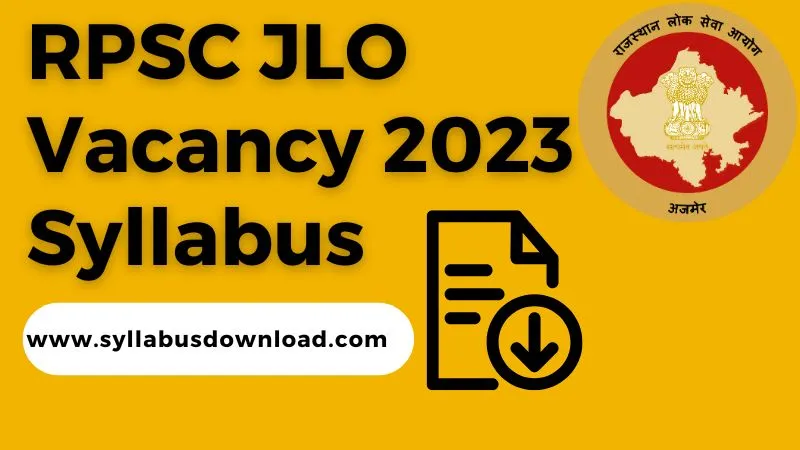The Agriculture University Jodhpur has released the Joint Entrance Test (JET) exam syllabus 2024 for the candidates preparing for the exam.
We are going to provide you with the complete detailed syllabus of Rajasthan JET syllabus 2024 along with the best books you can consider to clear the exam this year.
Contents
Rajasthan JET Exam Syllabus 2024 – Overview
The JET exam date is already announced and it’s high time now to start studying for the exam to clear it. The exam is going to be held on 02 June 2024.
You need to prepare 5 subjects including Agriculture, Physics, Chemistry, Biology, and Mathematics. The exam will be of 200 questions carrying 4 marks each for every correct answer and 1 mark will be deducted for a wrong answer.
| Particulars | Details |
|---|---|
| Conduction Body | Agriculture University Jodhpur |
| Exam Mode | Offline |
| Number of Papers | 1 |
| Number of Sections | 5 |
| Question paper type | Objective type questions (OMR) |
| Rajasthan JET 2024 Total Marks | 800 |
| Exam Duration | 2 hours |
| Exam Language | Bilingual (English and Hindi) |
| Official Website | https://jetauj2024.com/ |
Rajasthan JET Exam Syllabus 2024 – Subject Wise and Detailed
Here is the detailed subject-wise syllabus that you must prepare if you really want to clear the Rajasthan JET 2024.
The syllabus is provided by the Agriculture University Jodhpur.
Rajasthan JET Exam Syllabus 2024 – Agriculture
| Unit | Topic | Weightage |
| Unit A | Food production and its importance in the economy and nutritional security. History of Indian agriculture, branches, importance, and scope. Weather and Climate- Definition, elements, effects on crops, general introduction to weather-related equipment- Rain gauge, maximum-minimum thermometer, dry and wet hygrometer, wind vane, and anemometer. Irrigation– Requirement, time and quantity, methods of irrigation. Concept of precision and pressure irrigation- drip and sprinkler irrigation. Weed- Definition, peculiarities, classification, harmful effect, extension, methods of multiplication, weed control (mechanical, chemical & biological), Arid Agriculture- Definition, importance & principle, Crop rotation definition, importance and principle. Soil- Definition, composition, structure, texture, soil water, air, soil temperature, soil porosity, and factors affecting it. Saline, acidic, and alkali soil and their management, soils of Rajasthan. Soil samplings and their methods. Introduction to soil pH and organic carbon. Nutrient fertilizer- Essential plant nutrients, importance, and deficiency symptoms, importance of fertilizer, type (NPK), and methods of application. Irrigation – Importance of irrigation, sources of irrigation, water requirement of crops. Water drainage- Definition, need, importance, water logging, need of water conservation and methods (well, water recharge, water harvesting), Introduction to agriculture machinery- Definition and type of tillage, deshi plow, harrow, cultivator, combine harvester, seed cum fertilizer drill, planter, MB plow. Seed- Definition, type & quality of seed, seed production, seed dormancy. Role of Genetics and Plant breeding in self and cross-pollinated crops improvement, methods of breeding in field crops-introduction, Selection, Hybridization, Mutation. Agricultural Economics, Cooperative system in Agriculture, Crop insurance. Kisan Credit Cards. Marketing of Agricultural products (supply chain, retailing, wholesale), haats. Agronomy- Definition, importance and scope, soil fertility and productivity– Factors affect soil erosion & conservation. Crop production- Study of following crops under Rajasthan climate conditions in following points: botanical name, family, importance, climate, soil, preparation of field, improved varieties, seed rate, seed treatment, time of sowing, sowing method, manure & fertilizers, irrigation, intercropping plant protection & harvesting, threshing, yield and post-harvest management: Cereal- Rice, maize, sorghum, pearl millet, wheat & barley. Pulses- Black gram, green gram, moth bean, gram, pigeon pea, and cowpea. Oilseed- Mustard & rapeseed, groundnut, soybean, linseed and sunflower. Fodder- Lucerne and Berseem, Cash crops- Sugarcane, potato, and cluster bean, Fiber crops- Cotton and sun hemp. Organic farming: Definition, importance, concept, history, present status and future scope of organic farming, contribution to the national economy, important food products are grown organically. Organic manure and their utility, farm yard manure. Bio-fertilizer – Type & methods of application. Biological control of insects & diseases. Preparation of bio-pesticides (plant-based). General introduction to sustainable agriculture. | 15 Questions |
| Unit B | Importance and scope of fruit and vegetable crops, present position, and future scope. Orchard management- Selection of site, planning, layout, pit filling, plantation, adverse weather conditions- Frost, hot wind, hailstorm, drought, dust storm, heavy rainfall, and their remedies. Unfruitfulness and their remedies. Alternate bearing in the orchard and their solution. Application of plant growth regulators in orchards. Study of following important fruit crops with special reference to Botanical name, family, importance, climate, soil, improved varieties, plant propagation, planting, manure & fertilizer, irrigation, weeding & hoeing, yield and plant protection of- Mango, citrus (orange mandarin and lime), banana, guava, pomegranate, papaya, grapes, aonla, ber, date palm, & bael. Vegetable- Classification of vegetables, on the basis of season and vegetable parts used, type of vegetable cultivationCommercial & kitchen gardening. Nursery- Definition, importance, soil preparation and layout, sowing, transplanting, plant propagation- sexual and asexual. Vegetable cultivation- Botanical name, family, importance, climate, soil & field preparation, sowing, seed rate, and treatment, improved varieties, manures & fertilizer, irrigation, weeding and hoeing, plant protection, yield- Tomato, brinjal, chili, cauliflower, cabbage, pea, okra, carrot, radish, spinach, onion, garlic, round gourd, bitter guard, bottle guard, ridge guard, pumpkin. Ornamental gardening- Type of garden (formal and informal), private, public, and school garden, Study of ornamental plants- trees, bush, climbers, and seasonal flowers. Flower cultivation- Botanical name, importance, climate, soil, field preparation, plant propagation, improved varieties, planting, manure & fertilizer, care, picking & yield of rose, marigold, chrysanthemum and gladiolus. Spices- Cumin, coriander, fenugreek & fennel. Introduction and utility of medicinal plants- Safed muesli, Guggal, sanay, isabgol, Ashwagandha. Mushroom- Its nutritional status and methods of production. Beekeeping and its importance use, and importance of honey, wax, and royal jelly. Post-harvest- Importance, scope, and future of post-harvest management of fruits, vegetables, and flowers. Status of food processing in our country. Packaging, quality standards, and marketing including export. Preservation of fruits and vegetables- Present position of fruit and vegetable preservation, principle & methods of fruit preservation. Canning of fruit & vegetable, jam, jelly, marmalade, preserve, sauce, ketchup, pickle and squash. Flowers and their harvesting- Important processed flower products, packaging, storage, and marketing. | 15 Questions |
| Unit C | Importance of Livestock in Indian economy. Determination of age by teeth, horn, hoof, and body condition of animals and weight- by using Shafer formula, Animal BreedingIdentification of heat, introduction to reproductive organs, natural & artificial insemination. The general test of pregnancy. Care and management of pregnant & calwing animals. Animal nutrition- General principle of animal feeding. Determination of feed for Pregnant & milking cows and bullocks. Feed preservation- Hay and silage- Definition, importance, method for preparation. Animal health- Identification of healthy & suffering animals. Identification of general disease & treatment- Wounds, eczema, sprain, itching, inflammatory, indigestion, bloat, diarrhea, dysentery & food poisoning. Parasite- Lice & kilni. General medicine for animals and their utility- Phenyl, potassium permanganate, magnesium sulfate, alcohol, copper sulfate, tincher iodine, carboxylic acid, laizol, castor oil, kapoor, phenolic, alum, turpentine oil. Milking methods- By hand and machine, Poultry: Importance and scope, breeds of poultry & their classification. Study of poultry breeds- White leghorn, rod island red, red carnish, ply mouth rock breeds. Structure of egg. Poultry feed and housing management. Important disease of poultry (cause, symptoms, and treatment). Characteristics and utility of the following animal breeds Cow- Gir, Tharparkar, Haryana, Nagori, Malvi, Mewati, Rathi, Jersy and Holestein Friesian. Buffalo- Murrah, Bhadawari, Surti, Neeli, Jafrabadi and Mehsana. Sheep- Marwari, Chokla, Malpuri, Marino, Karakul, Avivastra, Adikalin and Jaisalmeri. Camel- Bikaneri & Jaisalmeri, management of camel. Animal diseases- Rinderpest, foot & mouth disease, black quarter, anthrax, Hemorrhagic septicemia, mastitis, tick fever, milk fever, enterotoxaemia, salmonellosis, bird flue, fowl fox, and Ranikhet trypanosome & itching. Dairy science- Milk and milk products curd and ghee. Development and dairy industry in India- White Revolution and operation flood. Bio-Waste Management and Government: Utilization of animals in Bio-wastes and Biogas plants, Important government schemes for the development of livestock dairy and poultry in India. Their important features and eligibility criteria. | 10 Questions |
Rajasthan JET Exam Syllabus 2024 – Physics
| Units | Topic | Weightage |
|---|---|---|
| Unit A | Magnetic effects of current: moving charges and magnetism, Magnetism, and matter, Electromagnetic induction and alternating currents: Electromagnetic induction, Alternating current, Electromagnetic waves, Dual nature of matter and radiation, Atomic & Nuclear Physics | 10 questions |
| Unit B | Gravitation, Properties of bulk matter: Mechanical properties of solids, Mechanical properties of fluids, Viscosity, Thermal properties of matter, Thermodynamics, Behavior of perfect gases and kinetic theory of gases, Mechanical Waves and ray optics: oscillations and waves, Wave motion, Ray optics, Scattering of light | 10 questions |
| Unit C | Electrostatics, Gauss’s law and its applications, Electrostatic potential and capacitance, Current electricity, Electronics & Communication, | 10 questions |
| Unit D | Magnetic effects of current: moving charges and magnetism, Magnetism and matter, Electromagnetic induction and alternating currents: Electromagnetic induction, Alternating current, Electromagnetic waves, Dual nature of matter and radiation, Atomic & Nuclear Physics | 10 questions |
Rajasthan JET Exam Syllabus 2024 – Biology
There are two subjects under this section: Botany and zoology.
Rajasthan JET Exam Syllabus 2024 – Botany
| Unit | Topic | Weightage |
|---|---|---|
| Section-I Botany: Unit A | Ecology and Environment, Environmental Issues, Forest resources, Biodiversity | 25 questions |
| Section-I Botany: Unit B | Economic Botany and Human Welfare, Millets, Cereals, Cereals, Oilseeds, Medicinal plants, Spices, Fruits, Cash crops, Fibres | |
| Section-I Botany: Unit C | The major diseases of crop and their control: Classification of diseases, Diseases of Kharif crops, Diseases of Rabi crops, Diseases of Fruit crops in Rajasthan | |
| Section-I Botany: Unit D | Biotechnology and Its Applications, Principles and processes, Essential equipment, Plant tissue culture | |
| Section-I Botany: Unit E | The major disease of crop and their control: Classification of diseases, Diseases of Kharif crops, Diseases of Rabi crops, Diseases of Fruit crops in Rajasthan |
Rajasthan JET Exam Syllabus 2024 – Zoology
| Unit | Topic | Weightage |
|---|---|---|
| Section-II Zoology: Unit A | Animal Kingdom, Taxonomy and classification of animals, Body organization and animal tissue, External and internal morphology, and internal structure of animals | 15 questions |
| Section-II Zoology: Unit B | Invertebrates, Protozoa, Helminthes, Annelida, Arthropoda, Mollusca, Honey bee, Methods of insect control | |
| Section-II Zoology: Unit C | Vertebrates, Nutrition in animals, Respiration in animals, Circulation in animals, Reproductive system, Reproduction & development |
Rajasthan JET Exam Syllabus 2024 – Chemistry
| Unit | Topic | Weightage |
|---|---|---|
| Unit A | Chemical kinetics, Chemical thermodynamics, acids and bases, colloidal state of matters, Metals, S-block elements, D-block elements | 10 Questions |
| Unit B | Organic Chemistry- Some basic principles and techniques, Valency of carbon and hybridization, Saturated hydrocarbons (up to 5 carbon atoms), Unstaurated hydrocarbons, Organic chemistry based on functional groups: HalidesCarbonyl groupsSynthetic and natural polymers, Chemistry in action. | 10 Questions |
| Unit C | Organic Chemistry- Some basic principles and techniques, Valency of carbon and hybridization, Saturated hydrocarbons (up to 5 carbon atoms), Unsaturated hydrocarbons, Organic chemistry based on functional groups: HalidesCarbonyl groupsSynthetic and natural polymers, Chemistry in action. | 10 Questions |
| Unit D | Organic Chemistry- Some basic principles and techniques, Valency of carbon and hybridization, Saturated hydrocarbons (up to 5 carbon atoms), Unsaturated hydrocarbons, Organic chemistry based on functional groups: HalidesCarbonyl groupsSynthetic and natural polymers, Chemistry in action. | 10 Questions |
Rajasthan JET Exam Syllabus 2024 – Mathematics
| Units | Algebra: Principle of mathematical induction, complex numbers and quadratic equations, Linear inequalities, Permuatations and combinations, Binomial theorem, sequence progression and series, Logarithm, Matrices, Determinants | Weightage |
|---|---|---|
| Unit A | Sets and Functions, Relations and functions | 5 Questions |
| Unit B | Straight Lines, Conic sections, Introduction to three-dimensional geometry | 5 Questions |
| Unit C | Vectors and three-dimensional geometry | 5 Questions |
| Unit D | Vectors and three dimensional geometry | 5 Questions |
| Unit E | Calculus: Limits and Derivatives, Continuity and differentiability, Applications of derivatives, Integrals, Application of integrals, Differential equations | 5 Questions |
| Unit F | Mathematical Reasoning, Linear programming | 5 Questions |
| Unit G | Statistics and Probability | 5 Questions |
| Unit H | Trigonometric Functions | 5 Questions |
Questions in Rajasthan JET 2024
Each section will have 40 questions. Every correct answer will be awarded 4 marks while every wrong answer will attract 1 negative mark.
| Name of the Subjects | Number of Questions |
|---|---|
| Agriculture | 40 |
| Chemistry | 40 |
| Biology | 40 |
| Mathematics | 40 |
| Physics | 40 |
Other Exam Syllabus:
- TSTET Paper 1 Syllabus 2024
- Gujarat Police Constable Syllabus 2024
- RPSC 2nd Grade 1st Paper Syllabus 2024
- Meghalaya Police Constable Syllabus 2024
- TN TRB Assistant Professor Syllabus 2024
- SSB Odisha Lecturer Syllabus 2024

Hey everyone, I’m Satish, and I’m a student preparing for various government exams. I created this webiste to let you all know the upcoming exam syllabus and help you prepare well for your exams.


